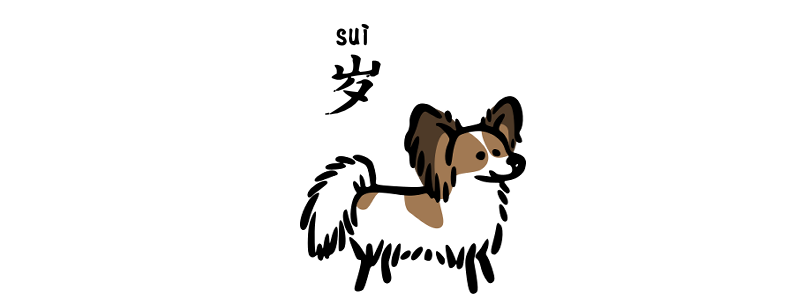Grammar Point:
In Chinese, the word 岁 suì is used to express age. It specifically refers to the number of years one has lived or their age in years.
Structure
S + Number + 歲/岁 suì
In Chinese, the word 歲 suì is considered a measure word, so there is no need for a linking verb like 是 shì between numbers and 歲 suì. Also, you should not use the measure word 個 ge before 歲 suì since it would be redundant.
弟弟15歲弟弟15岁
My younger brother is 15 years old.
我永遠18歲我永远18岁
I’m forever 18 years old.
我的狗七歲半我的狗七岁半
My dog is seven and a half years old.
這棵樹一千五百歲这棵树一千五百岁
This tree is 1,500 years old.
你媽媽今年也55歲嗎?你妈妈今年也55岁吗?
Is your mother also 55 years old this year?
我還沒19歲我还没19岁
I am not 19 years old yet.
我不是三歲小孩我不是三岁小孩
I’m not a three-year-old child.
FYI
The Chinese expression “我不是三岁小孩” actually translates to “I wasn’t born yesterday” in English. It is a figurative phrase commonly used to indicate that the speaker is not naïve, gullible, or easily fooled. It implies that the speaker is mature, experienced, and capable of understanding or seeing through certain situations or deceitful behavior.
Question
In Chinese culture, directly asking someone’s age is generally considered impolite. However, it is acceptable to ask about someone’s age in certain situations where it is relevant, such as when filling out official forms or determining eligibility for certain activities or services. There are few ways to ask people’s age in Chinese?
<Asking animals and people>
你幾歲?你几岁?
How old are you?
<Asking elder people like grandpa or grandma>
您多大?您多大?
How old are you?
您貴庚?您贵庚?
How old are you? (very polite)
<In hospital>
出生年月日?出生年月日?
What is your date and year of birth?
<Asking people age in Taiwan (informal)>
你幾年次的?你几年次的?
What year were you born in?
FYI
For this question, you need to answer in Taiwan Minguo Year. Taiwan has our own calendar system known as the Minguo calendar. In the Minguo calendar, the year is counted from the establishment of the Republic of China (ROC) in 1912. For example, the year 2023 in the Gregorian calendar would be referred to as the 112th year of the Republic of China (民国112年) in the Minguo calendar. It is commonly used in Taiwan for official purposes, such as on government documents and in some traditional contexts.
Common Mistakes
Remember the word 岁 suì is considered a measure word, so there is no need for a linking verb like 是 shì between numbers and 岁 suì. Also, you should not use the measure word 个 ge before 岁 suì since it would be redundant.
我是15歲我是15岁 ❌
我15個歲我15个岁 ❌


